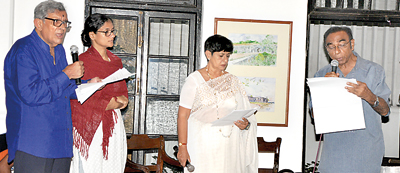A script inspired by people the author knew or admired
The Sri Lankan publication of the script of Ernest Macintyre’s ‘Irangani: A Tragedy of Our Times’ drew a full house at the Dutch Burgher Union on September 17. Having already been staged in Australia, the play grapples with questions that should resonate deeply with local audiences. Loosely based on the Greek tragedy Antigone, Macintyre’s script introduces a woman who is intent on giving her dead brother a family burial. Standing in her way is her uncle, the President of Sri Lanka.
Her brother Robert is dead, one of many to meet a premature end in the 1980s youth uprising. While Irangani argues that corpses cannot be illegal rebels, her uncle points out that to favour the boy with a burial – when the bodies of hundreds of other young men are being disposed of en masse – is an impossibility. “There is justice in my failure to give my brother a family burial,” Irangani acknowledges, bitterly. For Irangani, her failure opens the door to an intense empathy – if she, with all her connections, cannot manage it, what hope has anyone else of laying their children to rest? For the young woman, these questions are the key to her Pandora’s Box of doubts.

Ernest Macintyre (left) with some of the readers. Pic by Ranjith Perera
While a grief stricken Irangani is relentless in her determination to hold the state to account and to a higher standard than its rebellious opposition, Macintyre tries to balance the scales by exploring the challenges faced by the leadership of a country at war with itself. In President Sidat Rajakurana, the playwright says he wanted to create a character whose ruthless veneer hid a sensitive soul. A onetime professor of physics, it is to his science that Sidat returns for solace.
Irangani and Sidat, along with several other characters in the play, are inspired by people Macintyre knew or admired, a list that includes the late Winston Serasinghe, a famous actor and ex-policeman and Premawathi Manamperi, the beauty queen whose torture and brutal murder at the hands of the authorities was one of the most well publicised events of the 1971 insurrection in Sri Lanka. Irangani Serasinghe, whose name the female lead adopted, is still remembered for her starring role in Jean Anouilh’s Antigone inspired play which was staged in Sri Lanka in the 1950s. Unfor-tunately, the famous actress was taken ill and could not be present at the event.
We also see the long shadows cast by personages on characters that do not appear on stage but succeed in influencing the plot’s progression nevertheless – Macintyre named the politician Edmund Samarakkody and the actor, activist and writer Richard de Zoysa in the latter group. According to the playwright, the poem used by Irangani in this play is adapted from the actual poem at Richard’s bedside, which ends with the line: ‘when their civilization was dying out.’
Published by Vijitha Yapa, the script was launched in three languages, having been translated into Sinhala by the award winning author and translator Vijitha Fernando and into Tamil by the Jaffna based playwright Kulanthi Shanmugalingam. The readings from the play drew from all three versions, with noted thespians such as Ruwanthie De Chickera, Namel Weeramuni, Kaushalya Fernando, Sumathy Sivamohan, Wijeratne Warakagoda and Nicholas Kirutharshan delivering their lines in English, Sinhala and Tamil. The book itself was launched by the act of placing a bowl of temple flowers on it.
‘Irangani: A Tragedy of Our Times’ is priced at Rs.500/- and is available in all Vijitha Yapa Bookshops.
Follow @timesonlinelk
comments powered by Disqus



















